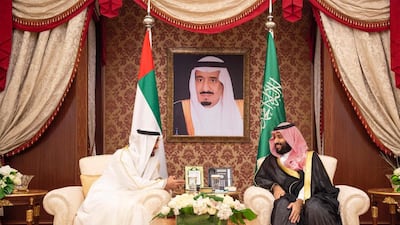In 1981, at Abu Dhabi's Intercontinental Hotel, Gulf leaders agreed to create the Gulf Co-operation Council, to build on the cultural, religious and economic ties that unite the peoples of this region. Today, the world is a markedly different place. The isolation of Qatar over its support for terrorism by the UAE, Saudi Arabia, Bahrain and Egypt continues in earnest. War rages in Syria and Yemen, while the scourge of terrorism still plagues Libya, Iraq and Afghanistan. Iran's destabilisation efforts have intensified; as has Israel's brutality towards the Palestinians. On Wednesday, the UAE and Saudi Arabia took historic strides to accelerate joint co-operation as the Saudi-Emirati Co-ordination Council convened for the first time in Jeddah, launching 44 projects across a number of key areas including the economy, knowledge development and the military. Overall, the Council heralds a new dawn for two historically close countries – and a pivotal moment for the region at large.
Rarely has the Middle East felt so unstable and its economies so stagnant. According to the United Nations, the region lost more than $600 billion in economic activity between 2011 and 2015. Meanwhile, US President Donald Trump's ruinous decision to relocate the American embassy to Jerusalem proved conclusively that Arab states cannot rely on foreign powers to take the lead on the region's problems. The Arab world must unite and take control of its own destiny. Doing so will require strong co-operation between the UAE and Saudi Arabia. Hence when the Council met this week, the region took a palpable step towards stability and it is Saudi Arabia and the UAE that the Arab world can look to as examples of prosperity and security. According to UAE Minister of Economy Sultan Al Mansouri, the combined output of the two countries – around $1 trillion – could account for 46 per cent of the total GDP of Arab states this year.
It was back in 2014 that the wheels were set in motion, with the formation of a joint exploratory committee. Two years later, the Saudi-Emirati Co-ordination Council was formed to promote religious, social and cultural ties. And two meetings last year laid the groundwork for this week's inaugural Council gathering. The effort is therefore years in the making. Known as The Strategy of Resolve, its projects are wide-ranging, encompassing among other things joint ventures in renewables, oil, gas and petrochemicals, investment funds for agriculture, infrastructure and education, as well as significant military co-operation. The Council will strengthen the ties that unite the region's two wealthiest nations and lift their global economic, tourism, political and military profiles. It follows a raft of economic and social reforms that have characterised a year of change in both Saudi Arabia and the UAE – including Abu Dhabi's Dh50bn stimulus package announced this week. Now is the time to promote stability and mutually beneficial ties in the Arab world. Together these two nations can help make it a reality.

